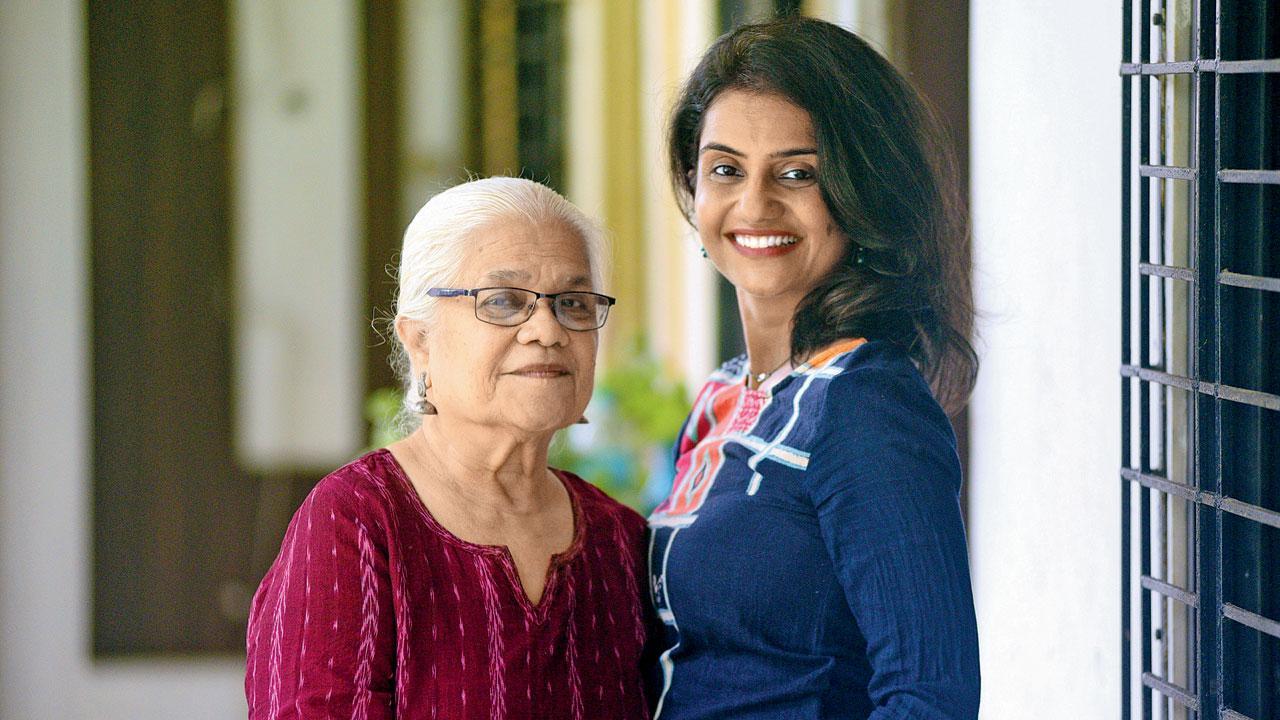Thanks to my mother, and Naseeruddin Shah’s prodding, I keep going back to theatre-Amruta Subhash
8:30 AM
Posted by Fenil Seta

As she readies to return to theatre with Firse Honeymoon, Amruta Subhash credits actress mother Jyoti for lessons on performance, life and everything in between
Aastha Atray Banan (MID-DAY; August 7, 2022)
“I once came home from school and mom was mumbling under her breath, reading a script. I asked her, what she was doing, and she said ‘one needs to spend some me time with the character. When one does that, the character opens up and speaks to you’,” says actor Amruta Subhash, while recalling a memory from her childhood. It has now become her go-to mantra when prepping for a role. We are sitting with the Bombay Begum actress and her theatre veteran mother Jyoti, who you will remember as the grandmother in Gully Boy, at their Kala Nagar home. Subhash’s Filmfare trophies and press cuttings adorn the study table.
The mother-daughter are in sync. Subhash recently put up a video on social media, celebrating her mother’s 75th birthday, expressing awe at her “waterfall” energy. “My mother was at NSD [National School of Drama], and one of her batchmates was Naseeruddin Shah, who was also my teacher. Later, I was course mates with Heeba [Shah’s daughter]. We would always share notes about how our parents were so accomplished, and what would we need to do to match up. Even now, when Naseer sir meets me he says, ‘Ya, I know you got an award for that show, but then are you doing theatre?’.”
That question perhaps did the trick. Subash, now along with working on two OTT shows, is returning to theatre with Firse Honeymoon. The play, written and directed by her husband Sandesh Kulkarni, who played Ganesh Gaitonde’s father in Sacred Games, is a relationship story. “It’s every couple’s story... What happens when the spark burns out? It’s about a couple revisiting the scene of their honeymoon 12 years later.”
Growing up, theatre was all around her. Thanks to her mum, she was surrounded by theatrewalas like Satyadev Dubey and Shriram Lagoo. Jyoti recalls, “At NSD, we did folk plays from all over the country, but we were also exposed to German, French and Russian plays. Artistes from those countries would come down and work with us. I remember acting with Naseer in Eugène Ionesco’s The Lesson.”
The septuagenarian has just finished shooting for a small part in Rajkumar Hirani’s Dunki, which stars Shah Rukh Khan. “My memory doesn’t serve me well, so doing larger parts is harder for me,” she confesses. Amruta adds, “When mom met SRK, she told him that she had met his father, who used to run the canteen at NSD. He leaned, and lowered his forehead so that she could kiss him.”
The mother and daughter seem content with where they are in life, and it reflects in their energy and beaming faces. “At 75, I have realized that nothing is constant. But some things remain the same. As far as art is concerned, or human expression is concerned, or valuation of each expression is concerned, that stays the same. So is our idea of good and bad. One is always striving to be better, and that struggle happens with actors all the time.”
Amruta admits that there is lot to learn from her mother. She remembers attending the rehearsals of Girish Karnad’s Tughlaq, where Jyoti played the evil stepmother. “I used to think, ‘at home, mum is so sweet, making bakhri for us, and on stage she is screaming’. What happens to her? I knew then that I wanted to learn everything about this process of being able to transform oneself.”
But the most important lesson that Amruta says she has learnt from her mother is to remember that the core of an artiste is about performing. “It’s not about seeking validation from how many people are watching the show. My mum comes from the tradition of Rashtriya Seva Dal [a grassroots-front organisation of the Indian National Congress]. They inculcated some values in my mum, which she inculcated in me. Everything is not about money, everything is not about being famous—the core is what you are getting out of it, and finding out what makes you happy. Thanks to my mother, and Naseer sir’s prodding, I keep going back to theatre, which gives me that happiness.”

This entry was posted on October 4, 2009 at 12:14 pm, and is filed under
Amruta Subhash,
Amruta Subhash interview,
Dunki,
Firse Honeymoon,
Heeba Shah,
Interviews,
Jyoti Subhash,
Jyoti Subhash interview,
Naseeruddin Shah,
National School of Drama,
Shah Rukh Khan
. Follow any responses to this post through RSS. You can leave a response, or trackback from your own site.
Subscribe to:
Post Comments (Atom)
Post a Comment